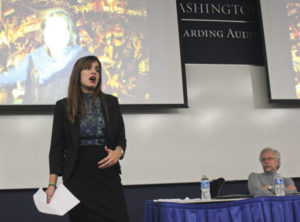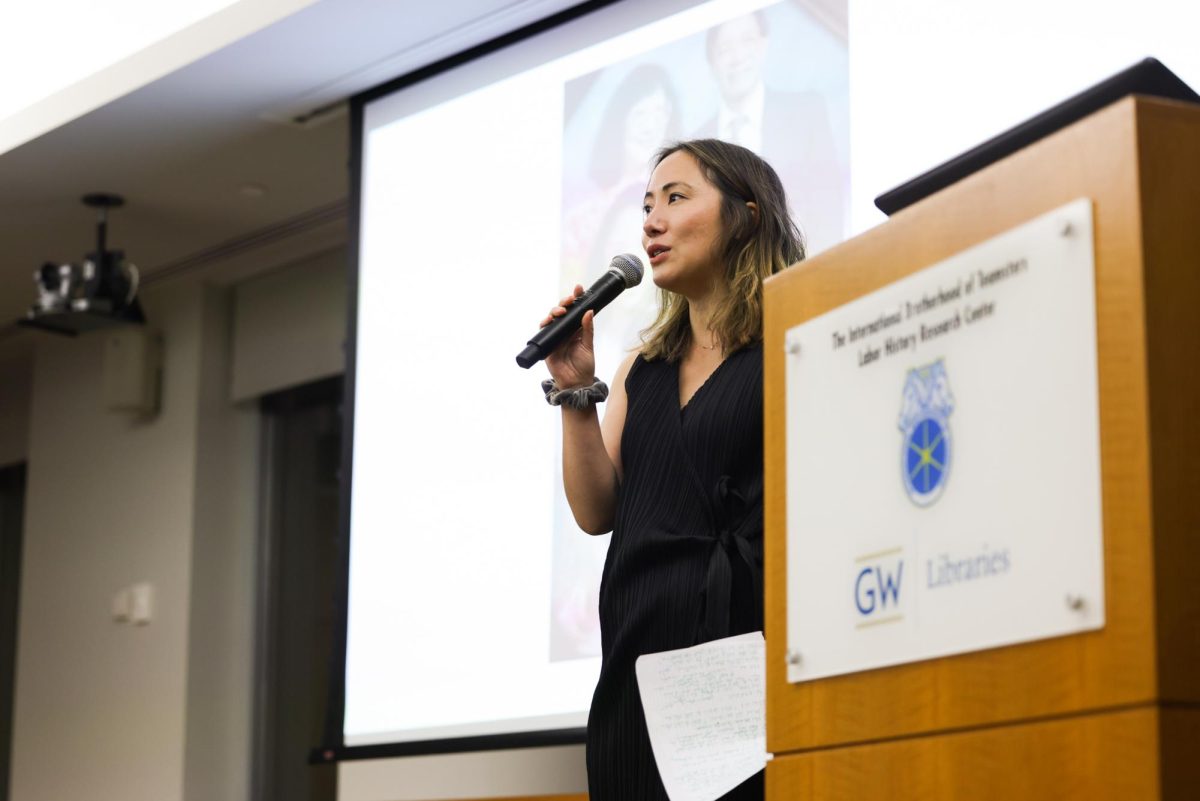
This post was written by Hatchet reporters Morgan Baskin and Jeanine Marie.
From a military coup halfway around the world to LGBT issues here at GW, the first events of Controversy Week tried to facilitate honest conversations among students and panelists.
Four-and-a-half months after the peaceful protests that led to former Egyptian President Mohammed Morsi’s overthrow, two Elliott School of International Affairs juniors recounted their summer study abroad experience during the GW Program Board’s Colonials in Cairo event Monday evening.
“I didn’t even hear the word ‘revolution’ until I sat next to this little old lady on the bus. She asked me if I knew what the Egyptians were planning on doing at the end of the month. And I was like, ‘No, what?” junior Anum Malik said.
“Days later I was being bombarded with emails and texts and stories about how much sexual harassment toward women I would see, particularly toward foreigners,” she added. “And before I left my apartment, I was thinking, ‘Oh my God, what is this war zone I’m living in right now?’”
Malik’s experience, however, was positive: She described the protest outside the Presidential Palace as “non-threatening,” saying she’s glad she was able to safely join the demonstration.
“I couldn’t have understood why the Egyptian people were doing this unless I had been there,” Malik said. “It was very eye-opening. They treated me and my Western friends with the utmost respect.”
Junior Rachel Movius, whose parents heeded the US.. Embassy’s urgent recommendation to fly back to the U.S. immediately after Morsi’s removal from office, similarly enjoyed her experience in Cairo in the days before the June 30 revolution.
“The air was buzzing with excitement. It was alive,” Movius said. “I didn’t feel unsafe, I just wanted to stay.”
During the second night of Controversy Week, the Program Board brought the conversation back to the University. Students from Allied in Pride and the Greek community discussed challenges and successes of helping lesbian, gay, bisexual and transgender members fit into fraternities and sororities. The panel included Emily Davol, senior and vice president of Panhel Community Relations, and Nick Gumas, junior and president of Allied in Pride.
The groups previously collaborated together during last year’s Allied in Greek. The event focused on“deconstructing national stereotypes of masculinity” in fraternities, Gumas said.
Gumas also mentioned that “identifying the correct terminology” is critical to fusing Greek and gay communities. GW, Gumas added, has policies that reflect its progressive atmosphere, noting that “just being in a city” makes the University more appealing for LGBT college applicants.
The Greek community also has its own stereotypes to fight. Gumas said that before participating in Allied in Greek, he believed the hype about “big, scary, competitive” exclusive fraternities and sororities. But as Davol explained, the administration closely monitors chapters, particularly during the rush process, and works to make the community more inclusive.
Davol said that despite Greek life activities geared mainly toward straight members, as participants take part in “mixers and date parties, GW is a community of acceptance.”
Last March, Allied in Greek brought together the LGBT and Greek communities at GW in a unique way – by having frat bros-turned-drag queens light up the Lisner stage.
Controversy Week continued Wednesday night with a screening of “Fruitvale Station”. Another panel Thursday night explored “Guns in America”, followed by an all-day event Friday featuring controversial topics chosen by student organizations.<



